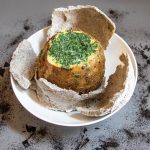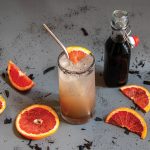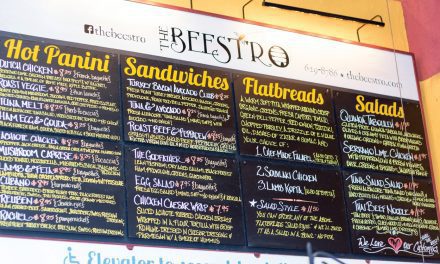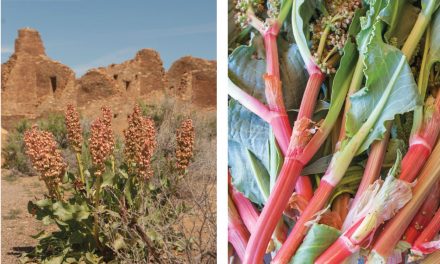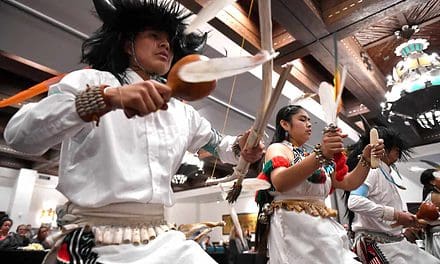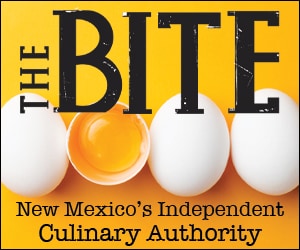Arable and Loyal Hound
By Jenn Shapland · Photos by Douglas Merriam

Renée Fox and Dave Readyhough at Arable.
Years ago, I regularly gathered with a group of friends at a bar that served truffle tater tots. These were exactly as wrong as you’d expect: tots that obviously came frozen in a bag, drizzled with overly rich, inappropriately expensive oil made from fungus found by pig snouts. But it was our ritual. I recalled these outlandish tots while seated at the bar of Arable, Renée Fox and Dave Readyhough’s Eldorado follow-up to their beloved Loyal Hound. At Arable, the green chile cheese tots we ordered arrived not in a basket, not even in a recognizably machine-made cylinder shape. These tots were handmade. And they were so much better than their frozen counterparts.
At both of their restaurants, Fox and Readyhough offer comfort food—food that is accessible, hearty, and tinged with nostalgia. But beyond the standard ingredients of comfort food, they’ve added an in-depth conscientiousness about food production. While we talked at a back table in Loyal Hound late one afternoon, surrounded by regular customers’ framed dog portraits, Fox returned again and again to the subject of sourcing. Fox explained, “We’re aware of what we’re feeding people… The pigs that we buy are pasture-farmed in a healthy environment, they’re raised humanely and they’re slaughtered humanely.” Relying on La Montañita Co-op to supply their produce, they’re aware of what is available from a number of local farmers, buying “local as much as possible, organic as much as possible.”
Emphasizing sustainability means not always prioritizing the bottom line. But at Loyal Hound and Arable, Fox and Readyhough aren’t looking to make bank, or cater only to a lofty clientele. “The whole idea of a gastropub is to be approachable to anyone, from any socioeconomic background. For some people this is a special occasion restaurant,” Fox tells us. Readyhough chimes in, “And some people come three or four times a week. It’s like Cheers. It’s all about perspective.” That evening, the restaurant was preparing for their popular monthly Supper Club, a seventy-five-dollar four-course dinner that includes wine and revolves around a theme. The idea came from Fox’s upbringing in the Midwest, where friends and neighbors would regularly gather together to eat and talk.

Grilled Talus Wind Ranch pork tenderloin with pine nut and currant sofrito, served with potatoes and arugula in a sherry chorizo dressing.
At Arable, two communal tables offer a similar chance to connect with others, though while the rest of the dining room and patio tables were full, communal seating seemed to be the last choice for diners the night we visited—which may say more about the community the restaurant serves, or the time it takes to build the kind of devoted following Loyal Hound has. We sat at the bar and enjoyed the company of a few regulars, eating tots and sandwiches and an unforgettable butterscotch budino. With Arable, the opportunity to bring something new to a small community inspired a different menu, with the same mindful approach they took at Loyal Hound. “When we went into Eldorado,” says Fox, “we went into all the other restaurants and really thought about what is missing in this community. What does this community need?” When they had octopus on the menu at Arable, locals thanked them for bringing something so unexpected to suburban El Dorado.

Left: Organic roasted strawberry ice cream sandwich with dark chocolate sauce. Right: Housemade local pork paté, dijon, pickles, and apple chutney.
The name Arable, which refers to land suitable for growing crops, came from Fox and Readyhough’s beliefs about the impact of food production on the larger ecosystem. “We specifically will not use anything feedlot,” Fox says. One of my favorite results of this kind of integrity is their kegged wine. I’d never had, or even heard of, wine from a keg. Fox, who has worked for a wine distributor for ten years, explained that wine you buy at the store might be “a label that was created by a marketing executive from bulk juice that came from who knows where, treated with who knows what pesticide.” Kegged wine is sealed and temperature controlled by the (often organic, solar powered) winemaker, and reduces the carbon footprint by eliminating bottling. It also allows restaurants to sell higher quality glasses of wine at a lower price. Sipping on the Gamay at Arable’s bar, my partner and I marveled at the freshness—perhaps it was a placebo effect, but the wine tasted better than any glass I’ve had recently.
“We know what’s in everything,” Fox told me, because almost nothing arrives at their kitchens frozen or pre-packaged, which is helpful with food allergies and dietary restrictions. “We have the tiniest freezers of any restaurants in Santa Fe. The ice cream is in there, the frozen chile,” but little else. Comfort food, then, might be about not just what comforts you, but what kind of food you are comfortable eating, what ingredients make you feel good. At Loyal Hound and at Arable, that can mean dirty fries, or fish and chips fried in the polyunsaturated oils they’ve been researching lately. Or it might mean beet salad with marcona almonds, which is comfort food for some. “Come here for dessert,” Readyhough offers. If that’s your go-to, “all our ice cream is homemade, using organic cream.”
Loyal Hound, 730 St Michaels, Santa Fe, 505-471-0440,
www.loyalhoundpub.com
Arable, 7 Avenida Vista Grande, Santa Fe, 505-303-3816,
www.arablesantafe.com
Edible celebrates New Mexico's food culture, season by season. We believe that knowing where our food comes from is a powerful thing. With our high-quality, aesthetically pleasing and informative publication, we inspire readers to support and celebrate the growers, producers, chefs, beverage and food artisans, and other food professionals in our community.


